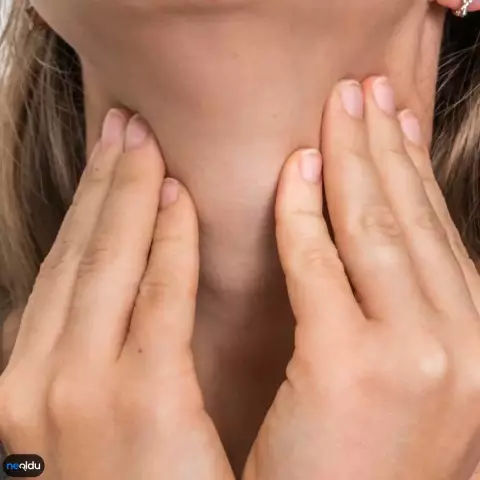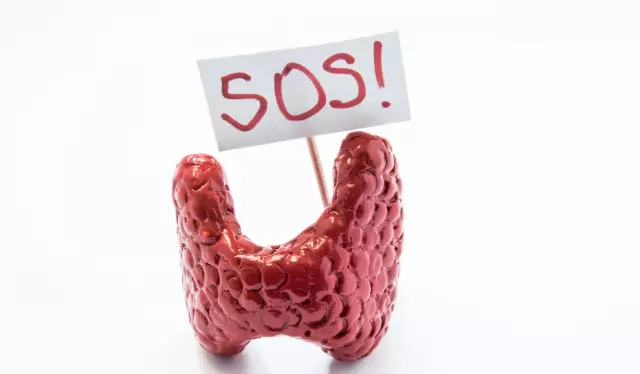- Author Rachel Wainwright wainwright@abchealthonline.com.
- Public 2023-12-15 07:39.
- Last modified 2025-11-02 20:14.
Diffuse toxic goiter

Diffuse toxic goiter (Graves' disease, Basedow's disease) is a disease accompanied by an increase in the size of the thyroid gland and excessive production of hormones, as a result of which there is a violation of all types of energy and metabolism in the body, as well as the functions of various organs and systems.
Causes of diffuse toxic goiter
The reason for the development of Basedow's disease is not exactly known. The main role is assigned to the violation of the immune system.
Most often, the disease develops as a result of autoimmune processes in the body, when, in addition to normal cells of a healthy body, the immune system synthesizes specific antibodies that damage healthy cells. So, with Graves' disease, an abnormal protein is synthesized, which provokes the thyroid gland to work intensively.
The disease is accompanied by thyrotoxicosis syndrome caused by prolonged and persistent excessive amounts of the hormones thyroxine and triiodothyronine in the body.
More often you can find diffuse toxic goiter in women, about 8 times more often than in men. Mostly the disease develops in middle age (30-50 years), but also occurs in adolescents and young people, during pregnancy and menopause.
Grades of diffuse toxic goiter
According to the severity of the course of thyrotoxicosis, three degrees of diffuse toxic goiter are distinguished: mild, moderate and severe. And according to the degree of enlargement of the thyroid gland, the disease is divided into 5 stages:
- Stage 1 - the thyroid gland is practically not palpable;
- Stage 2 - when swallowing, the thyroid gland is clearly visible;
- Stage 3 - the goiter is visible with the naked eye;
- Stage 4 - pronounced goiter;
- Stage 5 - a very large goiter.
Symptoms of diffuse toxic goiter
With a mild degree of diffuse toxic goiter, increased nervous excitability, decreased performance, tachycardia (up to 100 beats per minute), and a decrease in body weight (by 10-15% of the original) are noted.
With a disease of moderate severity, the characteristic symptoms of diffuse toxic goiter include significantly increased nervous excitability, tachycardia is up to 120 beats per minute, working capacity is practically lost, a person loses weight by 20% or more of the original body weight.
Severe thyrotoxicosis is characterized by severe weight loss (50% of body weight), severe tachycardia (more than 120 beats per minute), severe nervous irritability. For patients with severe thyrotoxicosis, atrial fibrillation, psychosis, heart failure, thyrotoxic liver damage are also characteristic.
In addition, the symptoms of diffuse toxic goiter are expressed by the following manifestations, which are classified as:
- Eye symptoms. With Basedow's disease, a uniform expansion of the palpebral fissure can often be observed, which gives the impression of a surprised look (bulging eyes). In severe forms of the disease, inflammation of the cornea, corneal ulcers, which pose a threat to vision, are possible.
- Cardiovascular symptoms. The most common symptom is tachycardia. The heart rate can range from 90 to 120 or more beats per minute. Graves' disease is characterized by the development of cardiovascular insufficiency, which is accompanied by pronounced edema of the extremities, edema of the skin, ascites.
- Dermatological symptoms. With Basedow's disease, there is increased sweating, erythema, destruction of nails, edema on the legs.
- Digestive system symptoms. There is a significant increase in appetite. This is due to the acceleration of metabolism. Due to increased intestinal motility, patients often experience diarrhea. There is a violation of the liver, up to the development of cirrhosis.
- Endocrine symptoms. There is a decrease in the function of the adrenal cortex and gonads, diabetes mellitus may develop. In women of childbearing age, there is a decrease in the frequency and number of menstruation.
- Neurological symptoms. The most common symptoms of diffuse toxic goiter are increased fussiness, reactivity, excitability, and general motor restlessness. The patients are characterized by trembling of fingers, muscle weakness, headache.
- Dental symptoms. The disease is often accompanied by multiple caries, sometimes periodontal disease.
Complications of diffuse toxic goiter

The most serious complication of the disease is a thyrotoxic crisis. The following factors contribute to its occurrence:
- lack of adequate treatment for Graves' disease over a long period of time;
- increased physical activity;
- a difficult situation that caused severe stress or mental trauma;
- any surgical intervention;
- treatment of goiter with radioactive iodine, as well as surgical treatment of goiter without prior medical compensation;
- infectious diseases.
In a thyrotoxic crisis, an excessive amount of thyroid hormones enters the bloodstream, which causes extremely severe damage to the cardiovascular and nervous systems, liver and adrenal glands.
Diagnostics of the diffuse toxic goiter
Determining the disease is not particularly difficult. Confirm the diagnosis with the help of laboratory blood tests for the level of thyroid hormones. Also in the blood there is an increased concentration of iodine and a reduced amount of cholesterol.
If, in the presence of symptoms of thyrotoxicosis, the thyroid gland is not palpable, its atypical location is likely. However, you should be aware that the symptoms of thyrotoxicosis can manifest themselves in other diseases: mixed and nodular goiter, thyroiditis, cancer and tumor of the thyroid gland.
Treatment of diffuse toxic goiter
For effective therapy, it is extremely important to provide the patient with a calm environment and establish healthy sleep. Nutrition should be complete, with a high content of vitamins and proteins. Treatment of diffuse toxic goiter can be medication or with the use of radioactive iodine. In severe forms of the disease, surgical treatment is preferable.
Medical treatment of diffuse toxic goiter is usually quite long. The doctor prescribes antithyroid drugs, potassium preparations, thiouracil and imidazole derivatives, iodine preparations, sedatives. The minimum duration of therapy is six months. Basically, the patient takes medications for 1 - 1.5 years. If drug therapy fails, other treatments should be considered.
Radioiodine therapy is a fairly effective method of treatment, which, however, has many contraindications, including peptic ulcer disease, tuberculosis, mental disorders, pregnancy and lactation.
Surgical treatment of diffuse toxic goiter is preferable in the presence of allergic reactions, too large an increase in the goiter (grade 3 and higher), as well as with too pronounced symptoms of cardiovascular insufficiency.
YouTube video related to the article:
The information is generalized and provided for informational purposes only. At the first sign of illness, see your doctor. Self-medication is hazardous to health!






